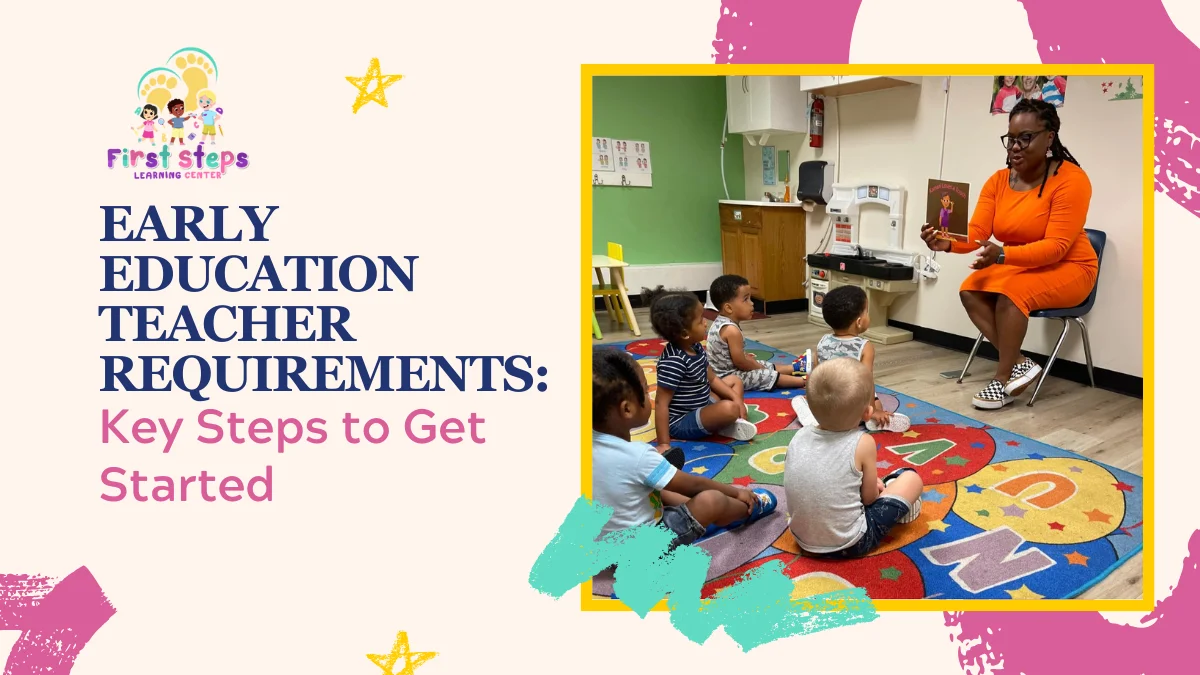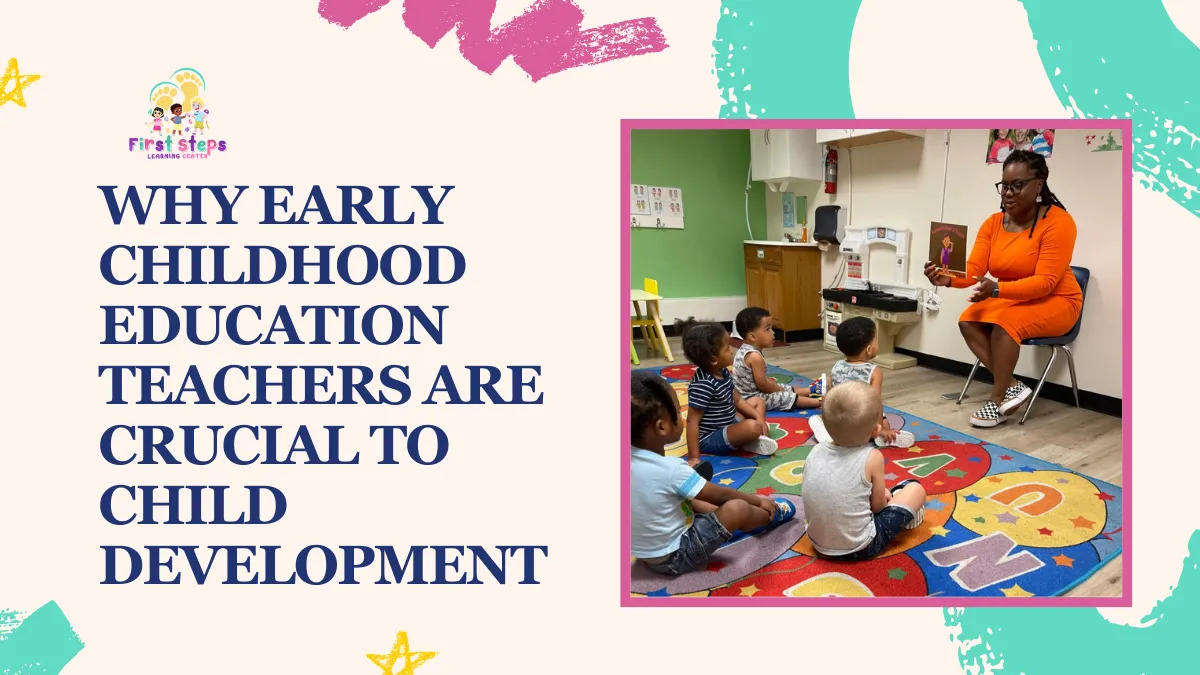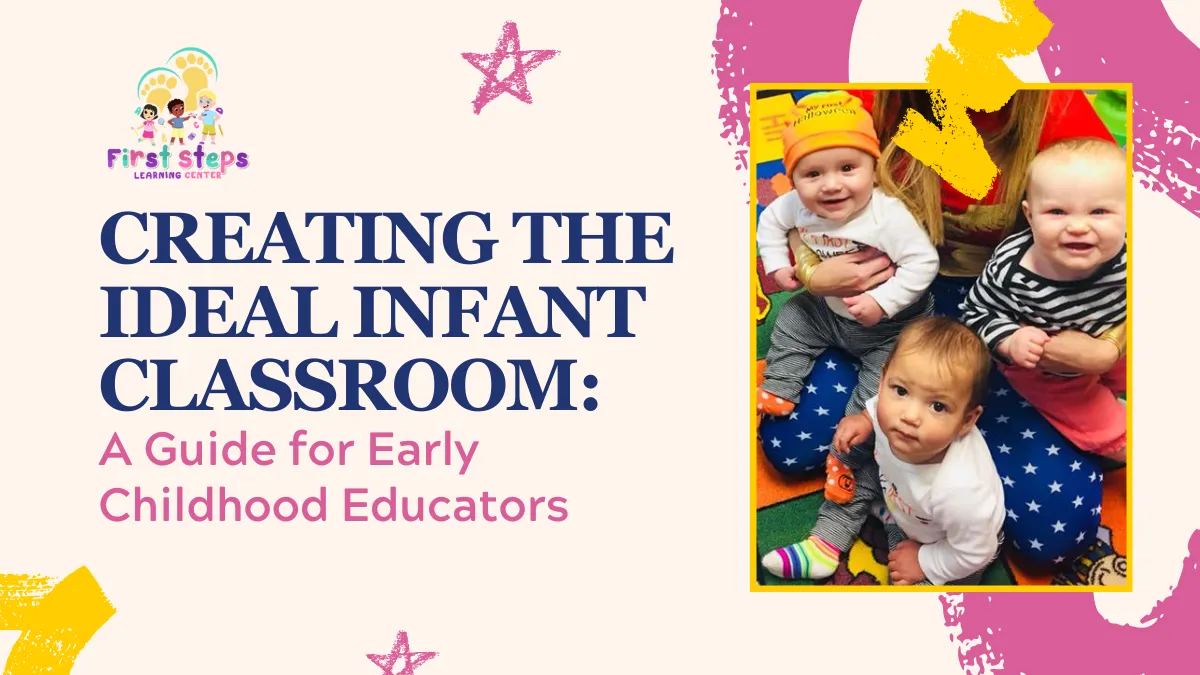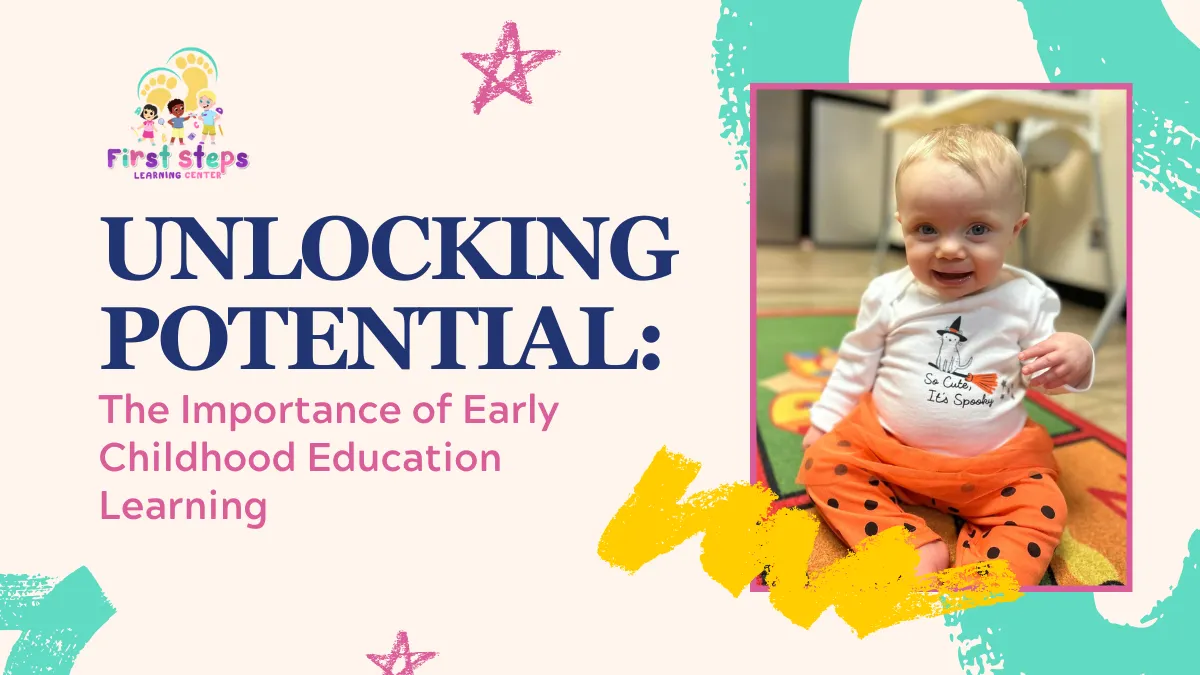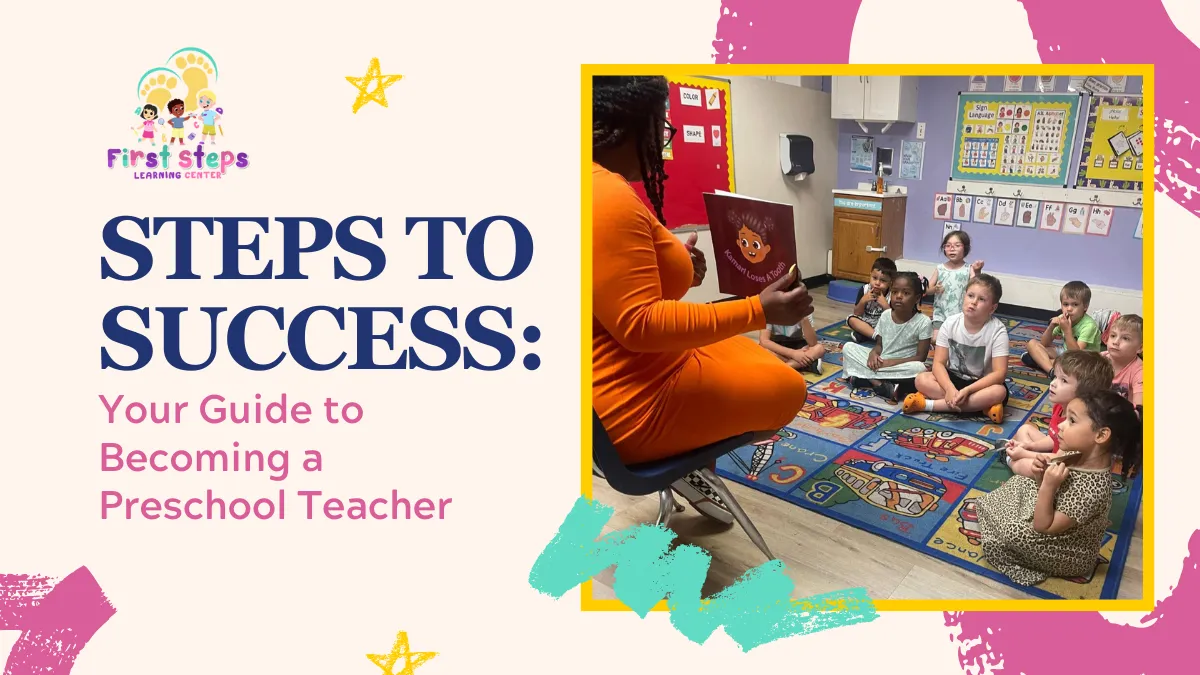Early Education Teacher Requirements: Key Steps to Get Started
Early education teacher requirements play a crucial role in shaping the path to becoming a successful educator for young children. Whether you’re passionate about fostering a love for learning in preschoolers or supporting infants in their developmental milestones, understanding these requirements is the first step toward making a difference in young lives.
At First Steps Learning Center, a nurturing, dedicated, well-prepared teacher sets the foundation for lifelong success. This guide covers the essential qualifications, certifications, and personal qualities needed to excel as an early education teacher. With the necessary preparation, you can embark on a fulfilling career that supports the growth and development of our future leaders, one step at a time.
Becoming an Early Childhood Teacher: Your First Steps
Becoming an early childhood teacher is both exciting and rewarding. As an educator for young learners, you’ll play a pivotal role in shaping their futures during some of the most critical years of development This section outlines the vital steps to guide you toward a fulfilling career in early childhood education.
Understand the Role of an Early Childhood Teacher
Before diving into this career, it’s crucial to understand what the role entails. Early childhood teachers work with children from infancy to eight, providing foundational literacy, numeracy, social interaction, and emotional development skills. Teachers also foster creativity and curiosity, helping children explore the world around them in a safe and supportive environment.
The role involves:
- Designing and implementing age-appropriate lesson plans.
- Monitoring developmental milestones.
- Collaborating with parents and caregivers to provide for each child’s unique needs.
- Creating a nurturing classroom atmosphere that encourages growth and learning.
Evaluate Your Passion and Skills
Becoming an early childhood teacher requires more than academic qualifications; it calls for a genuine passion for working with young children. Consider whether you have the following skills:
- Patience and empathy: Essential for managing the needs of young learners.
- Strong communication skills: Effectively interact with children, parents, and colleagues.
- Creativity: To design engaging activities that capture children’s interests.
- Adaptability: To handle unexpected challenges with a positive attitude.
If these qualities resonate with you, you’re already on the right path.
Take the Necessary Steps Toward Qualification
To officially begin your journey, you’ll need to meet specific educational and professional requirements:
- Research Educational Pathways: Most positions require at least an associate’s or bachelor’s degree in childhood education or a related field. Some advanced roles may need further qualifications, such as a master’s degree.
- Gain Hands-On Experience: Practical experience is invaluable. Seek opportunities to volunteer at daycare centers, preschools, or after-school programs. Many degree programs also include student teaching components to provide real-world practice.
- Obtain Certification: Depending on your state, you may need additional certifications, such as the Child Development Associate (CDA) credential or a teaching license. Check your local requirements to ensure compliance.
Explore Resources for Support and Growth
Navigating this career path can be challenging, but numerous resources are available to help:
- Professional Organizations: Groups like the National Association for the Education of Young Children (NAEYC) offer guidance and support.
- Workshops and Online Courses: Continuous learning helps you stay updated on best practices.
- Mentorship Opportunities: Experienced teachers can provide valuable insights and encouragement.
By taking these first steps thoughtfully and with dedication, you can develop a strong foundation for a successful and fulfilling career as an early childhood teacher.
Understanding the Education Needed for Preschool Teacher Roles
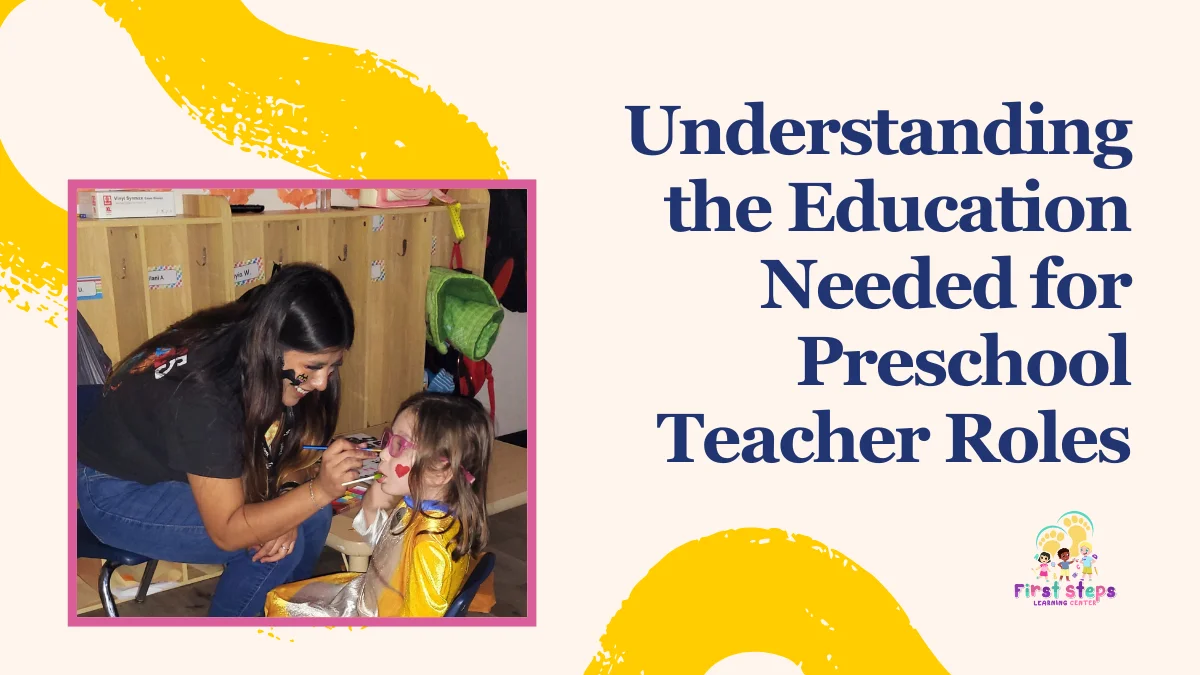
Education is the cornerstone of any preschool teacher’s journey. The qualifications and training required equip you to provide young learners with the foundational skills they need to thrive. This section explains the education needed for preschool teacher roles and how to prepare for a meaningful career in early childhood education.
Essential Educational Requirements
To work as a preschool teacher, specific educational milestones must be achieved. Requirements may vary by state and employer, but the following are typical:
- High School Diploma or GED: This is the first step for entry-level positions, such as teacher aides or assistants.
- Associate’s Degree: Many preschools require an associate’s degree in childhood education or a similar field. These programs cover child development, classroom management, and lesson planning.
- Bachelor’s Degree: A bachelor’s degree is often mandatory for lead teacher roles or positions in state-funded programs like Head Start. Coursework typically includes early literacy, psychology, and educational theory.
- Master’s Degree (Optional): Some advanced roles, such as curriculum developers or preschool directors, may require a graduate degree in early education or a related specialty.
Core Coursework and Skills Development
The education needed for preschool teacher roles involves more than meeting degree requirements. Your coursework will focus on the skills and knowledge necessary for fostering young children’s growth:
- Child Development: Understanding young children’s physical, cognitive, and emotional milestones.
- Teaching Methods: Training in how to design engaging, age-appropriate lesson plans.
- Behavior Management: Techniques for maintaining a positive, productive classroom environment.
- Cultural Competency: Preparing to work with children and families from diverse backgrounds.
- Observation and Assessment: Learning to identify developmental delays and tailor interventions.
Practical Training and Internships
Hands-on experience is an integral part of becoming a preschool teacher. Most degree programs include fieldwork or internships in early childhood settings. These opportunities allow you to:
- Apply classroom theories to real-life teaching situations.
- Develop confidence in managing groups of young children.
- Build relationships with mentors and professional networks.
Certifications and Continuing Education
While degrees provide a strong foundation, many states and institutions require additional certifications:
- Child Development Associate (CDA): A widely recognized credential demonstrating proficiency in early childhood education.
- State Teaching License: Necessary for public preschool roles in many states.
- Ongoing Professional Development: Workshops, seminars, and online courses help you stay current with best practices and new research.
By investing in your education and continuously improving your skills, you’ll be well-prepared to guide and inspire the next generation of learners. Proper training ensures you can meet every child’s unique needs, creating a lasting positive impact.
Exploring Early Childhood Education Learning Pathways
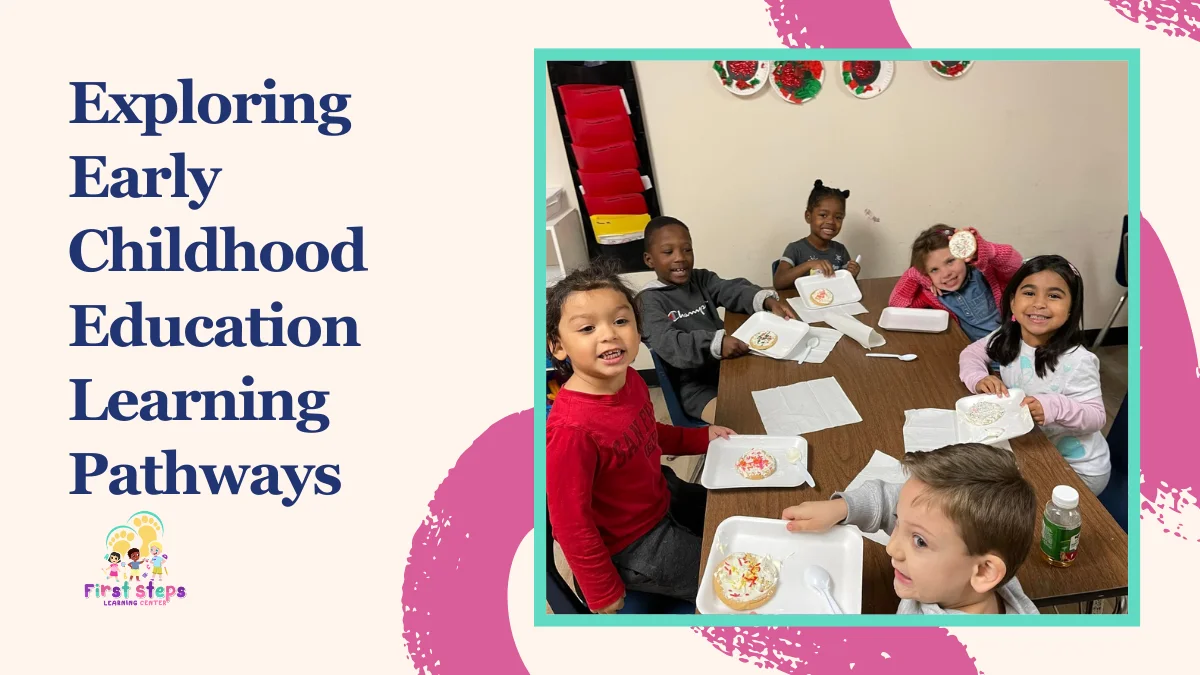
Embarking on a career in early childhood education learning is a journey filled with opportunities to grow, inspire, and make a lasting impact on young lives. The right learning pathways are essential to building the knowledge and skills to excel in this rewarding field. This section will explore the various avenues to prepare for and thrive in early childhood education.
Formal Education Programs
Education is the foundation of every early childhood educator’s success. Formal education offers structured and comprehensive training, whether you are seeking to advance your career.
- Certificate Programs:
- Ideal for entry-level roles like teacher assistants or childcare aides.
- Focus on the basics of child development and classroom management.
- Associate’s Degrees:
- Typically, two-year programs cover foundational topics such as child psychology, early literacy, and curriculum design.
- Often a requirement for many preschool teaching positions.
- Bachelor’s Degrees:
- Offer in-depth study, including courses on assessment techniques, special education, and teaching diverse populations.
- Provide eligibility for lead teacher roles and positions in public or state-funded programs.
- Advanced Degrees and Specializations:
- Master’s programs or certifications allow educators to focus on specialized areas like special education, bilingual education, or curriculum development.
Hands-On Learning Opportunities
Practical experience is an essential part of any early childhood education learning pathway. Immersing yourself in real-world settings helps bridge the gap between theory and practice.
- Student Teaching Programs: Most degree programs include a student-teaching component, allowing you to work under the guidance of experienced educators.
- Volunteering: Experience in daycare centers, after-school programs, or nonprofit organizations builds hands-on skills and strengthens your resume.
- Internships: Paid or unpaid internships provide valuable insights into classroom management, lesson planning, and engaging with families.
Online Learning and Professional Development
The digital age has made learning more reachable than ever. Online programs and workshops allow aspiring educators to learn at their own pace.
- Online Degree Programs: Flexible and convenient options for earning associate’s, bachelor’s, or even master’s degrees in early childhood education.
- Professional Development Workshops: Short-term courses focus on skills like integrating technology into teaching or understanding children with special needs.
- Webinars and Conferences: Opportunities to form relationships with peers, learn from experts, and stay updated on the latest educational trends.
Building a Lifelong Learning Mindset
Learning never stops in early childhood education. Engaging in ongoing education ensures you stay equipped to meet children’s evolving needs. Seek mentorship, join professional organizations, and prioritize continuous improvement to make a lasting impact in your field.
By exploring these diverse learning pathways, you can build a strong foundation for a fulfilling career in early childhood education while staying committed to growth and excellence in this vital profession.
Conclusion
Embarking on becoming an early education teacher is a fulfilling and impactful endeavor. From understanding the foundational requirements to pursuing hands-on experience and lifelong learning, each step brings you closer to shaping the lives of future generations. As an early childhood educator, you’ll nurture creativity, ignite curiosity, and help children build the skills they need to thrive. The path may have challenges, but the rewards of watching young learners grow and succeed make it all worthwhile.
Ready to take the first steps toward your dream career in early education? Let First Steps Learning Center guide you! Whether you seek guidance or a nurturing environment for hands-on experience, we support your aspirations. Contact us today at 281-392-9194 or visit our website to learn more. Let’s build a brighter future together!

